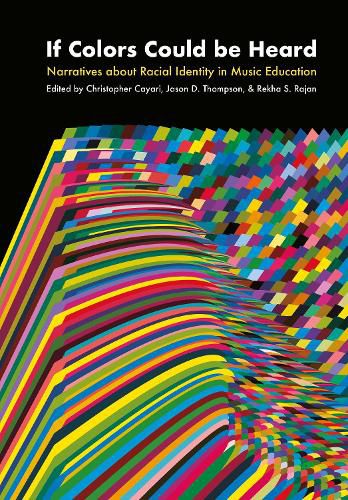Readings Newsletter
Become a Readings Member to make your shopping experience even easier.
Sign in or sign up for free!
You’re not far away from qualifying for FREE standard shipping within Australia
You’ve qualified for FREE standard shipping within Australia
The cart is loading…






A deeply personal and scholarly exploration of how race and ethnicity shape the ways we learn, teach, and experience music.
If Colors Could Be Heard: Narratives About Racial Identity in Music Education is a groundbreaking collection of firsthand accounts by music educators, artists, activists, and students from the Global Majority. These deeply personal narratives explore how race and ethnicity shape experiences in music learning, making, and teaching.
From stories of childhood discovery to reflections on navigating racial identity in the classroom, these voices paint a complex and vivid portrait of music education in the United States. Going beyond a collection of research studies, this book embraces self-reflective storytelling as a legitimate and essential method of inquiry, offering a scholarly mosaic of lived experience.
By centering voices often marginalized in academia, If Colors Could Be Heard challenges dominant narratives and reimagines music education through a lens of equity, identity, and belonging. A must-read for students, educators, and researchers committed to fostering an inclusive and just musical future.
$9.00 standard shipping within Australia
FREE standard shipping within Australia for orders over $100.00
Express & International shipping calculated at checkout
Stock availability can be subject to change without notice. We recommend calling the shop or contacting our online team to check availability of low stock items. Please see our Shopping Online page for more details.
A deeply personal and scholarly exploration of how race and ethnicity shape the ways we learn, teach, and experience music.
If Colors Could Be Heard: Narratives About Racial Identity in Music Education is a groundbreaking collection of firsthand accounts by music educators, artists, activists, and students from the Global Majority. These deeply personal narratives explore how race and ethnicity shape experiences in music learning, making, and teaching.
From stories of childhood discovery to reflections on navigating racial identity in the classroom, these voices paint a complex and vivid portrait of music education in the United States. Going beyond a collection of research studies, this book embraces self-reflective storytelling as a legitimate and essential method of inquiry, offering a scholarly mosaic of lived experience.
By centering voices often marginalized in academia, If Colors Could Be Heard challenges dominant narratives and reimagines music education through a lens of equity, identity, and belonging. A must-read for students, educators, and researchers committed to fostering an inclusive and just musical future.